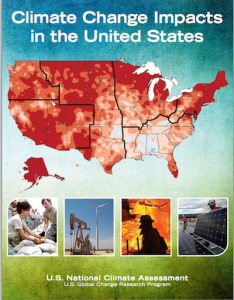May 6, 2014
The Climate Conversation Needs Your Voice
Posted by kcompton
By Lexi Shultz, Director of Public Affairs at the American Geophysical Union
Today, the White House released the U.S. Global Change Research Program’s (USGCRP) third National Climate Assessment (NCA). This report, coming in at 1,300 pages and written by more than 300 authors (many of whom are American Geophysical Union members) is an impressive accounting of the many current and future effects of climate change across the country. The NCA synthesizes and summarizes the ways in which all regions and aspects of the U.S.—from Alaska to Florida, from human health to energy and national security—are being affected by climate change and will continue to be affected.

The third National Climate Assessment was released Tuesday, May 6th by the U.S. Global Change Research Program (USGCRP)
But what excites me most about the NCA is the accessibility of the information and the report’s focus on—in addition to the scientific findings—decision making in the face of uncertainty. Affected communities need information now about how they can cope with the effects they are feeling already, as well as how they can prepare for what’s to come. The information the NCA provides can help with that. The report also makes clear, however, that some of the projected impacts will be very costly – and unpleasant – to deal with. As a result, I’m glad to see an emphasis not only on adaptation and preparation, but also mitigation.
The American Geophysical Union’s stated position on climate change, written in 2003 and revised and reaffirmed most recently last year, is titled “Human‐Induced Climate Change Requires Urgent Action.” AGU, through its members, crafted this statement to help us grapple with what we believe to be one of society’s greatest challenges.
This NCA report only emphasizes this point. AGU is committed to making sure that the NCA remains part of the conversation and that we don’t lose sight of it as an important resource as we move forward. For example, the report will play an important role in shaping our discussion of climate change preparedness at our Science Policy Conference in June.
But we cannot do this alone. As the Director of Public Affairs at AGU, I think daily about how to connect scientists with policy makers and public. Scientists, policy-makers, and the public must not be siloed. My hope is that the NCA report, crafted for accessibility and usability will provide us with an opportunity to continue the dialogue between these three communities and to develop solutions that are regionally appropriate and based on sound science.
This is where you come in. Explore the USGCRP website and the interactive report online. Then, I’d like to personally encourage you to engage with your communities on the topic of climate change preparedness, adaptation, and mitigation. Write a letter to the editor of your local newspaper, contact your legislators, or set up a community meeting, and then tell us about your experience using the Sharing Science tool on our website. As the one of the key findings of the NCA report states, “There is no ‘one-size fits all’ adaptation, but there are similarities in approaches across regions and sectors. Sharing best practices, learning by doing, and iterative and collaborative processes including stakeholder involvement, can help support progress.” If we are to make true progress toward climate change adaptation and mitigation, we need to start the conversation, from grassroots to grasstops, and across communities. Do you have ideas for ways AGU can be involved? Leave us a comment here or send us an email to [email protected].









I live in northern Canada where we have experienced massive fires in the boreal forest with losses totalling billions of dollars. Activities to develop Coal and Oil and Gas resources in this area continue at a quickening pace. If the CO2 emissions of our activities continue at the SRES A1 scenario as I believe they will it will mean that the fires will continue to occur at a more rapid pace throughout the boreal forests of Canada and the northern United States in the future. I invite people to check this website, http://en.wikipedia.org/wiki/2011_Slave_Lake_wildfire, to see the fire impacted to one northern Canadian community. Prepare and protect yourselves now. Walter Andreeff- Canadian EGU science member
[…] American Geophysical Union: https://thebridge.agu.org/2014/05/06/the-climate-change-conversation-needs-your-voice/ […]
I think this is one of the most vital information for me.
And i am glad reading your article. But want to remark on some general things, The website
style is ideal, the articles is really nice : D. Good
job, cheers